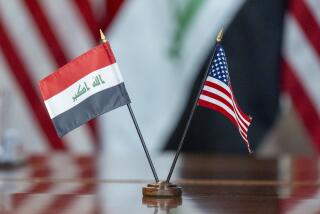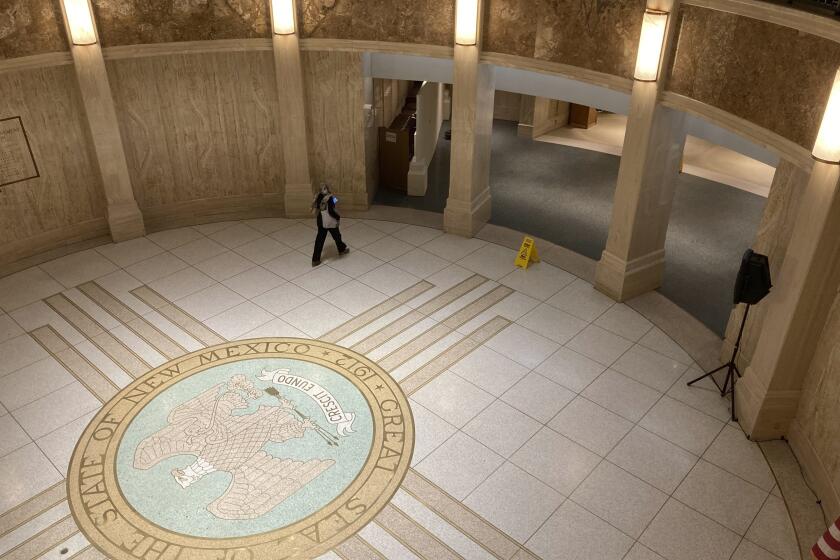Iraq Report File
Recent U.S. reports on Iraq
Friday’s White House report on progress in Iraq capped two months of major government assessments. Here is a summary of the major documents as well as earlier government reports, not including military or congressional reports.
White House Benchmark Assessment Report (Sept. 14)
Iraqis are making satisfactory progress toward nine of 18 benchmarks, an improvement from July, when one benchmark showed such progress. “There are encouraging signs that point the way to a more normalized and sustainable level of U.S. engagement in Iraq” while decreasing U.S. forces, the report says. It adds: “Very significant challenges remain.”
https://www.whitehouse.gov/news/releases/2007/09/20070914.html
Testimony by Gen. David H. Petraeus and Ambassador Ryan C. Crocker (Sept. 10-11)
The security situation is complex and “downright frustrating,” but it is “possible to achieve our objectives,” says Petraeus (pictured at right), recommending a drawdown of at least 21,500 troops by July. Military objectives “are in large measure being met.” Crocker says the goal of a “secure, stable” Iraq is attainable but adds, “I cannot guarantee success in Iraq.”
https://armed-services.senate.gov/statemnt!/2007/September/Petraeus%2009-11-07.pdf https://armed-services.senate.gov/statemnt/2007/September/Crocker%!2009-11-07.pdf https://foreign.senate.gov/hearings/2007/hrg070911a.html https://www.foreignaffairs.house.gov/110/pet091007.pdf https://www.foreignaffairs.house.gov/110/cro091007.pdf
Government Accountability Office (Sept. 7)
The number of Iraqi army units capable of operating independently declines to six in July, from 10 in March. Three of Congress’ benchmarks are attained, four partly attained. A GAO official testifies that Iraqis may be unable to hold security gains achieved by the U.S. troop buildup.
www.gao.gov/new.items/d071230t.pdf
Independent Commission on the Security Forces of Iraq (Sept. 6)
Created by Congress, the commission led by Gen. James L. Jones says that the Iraqi army has made “impressive progress” in its ability and willingness to defend against internal threats but that the Iraqi national police are so unreliable and riddled with sectarian groups’ operatives that the 25,000-officer force should be disbanded.
www.csis.org/component/option,com_csis_progj/task,view/id,1028/
National Intelligence Estimate, unclassified summary (Aug. 23)
There have been “uneven” improvements in security, but Prime Minister Nouri Maliki is still unable to govern effectively. Iraq’s political situation will probably become more precarious in the next six to 12 months. Fighting among Shiites “probably will intensify.” Sunni Arabs are “politically fragmented.” Sunni cooperation has hindered militant attacks.
www.dni.gov/press_releases/20070823_release.pdf
Initial White House report on benchmarks (July 12)
The troop surge has made some headway. Of 18 benchmarks, progress has been satisfactory on eight, unsatisfactory on eight and difficult to evaluate on two. Security remains “complex and extremely challenging.” The most significant lack of progress is in areas involving political reconciliation. The utility of benchmarks is questionable.
www.whitehouse.gov/news/releases/2007/07/20070712.html
Earlier U.S. reports
National Intelligence Estimate, unclassified summary (Feb. 2)
Deterioration in Iraq is so bad that security improvements, even if achievable, are unlikely to enable the Iraqi government to provide stability in the next year. Political reconciliation is unlikely over 18 months; regional conflict is increasingly possible. U.S. troops have a stabilizing influence and Iraqi forces are unlikely to survive a rapid U.S. withdrawal.
www.dni.gov/press_releases/20070202_release.pdf
White House Iraq Strategy Review on “New Way Forward” (Jan. 10)
A “new phase” requires a U.S. troop buildup to “foster the conditions for Iraqi national reconciliation ..... with the Iraqi government clearly in the lead.” The U.S. will be in a support role, with “responsibility for success on the Iraqis.” The U.S. has achieved many objectives, but the situation has grown “increasingly complex.”
www.whitehouse.gov/nsc/iraq/2007/iraq-strategy011007.pdf
Iraq Study Group, Baker-Hamilton Commission (Dec. 6, 2006)
The U.S. should begin talks with Iran and Syria and more actively seek a solution to the conflict between Israel and the Palestinians. In a “diplomatic offensive,” the U.S. should negotiate with insurgents. The mission of U.S. troops should be training the Iraqi army; all 15 U.S. combat brigades could be withdrawn by early 2008.
www.usip.org/isg/iraq_study_group_report/report/1206/index.html
National Intelligence Estimate on global terrorism, declassified summary (April 2006, released Sept. 26, 2006)
The Iraq war is a major catalyst for worldwide Islamic radicalism. “The Iraq conflict has become the ‘cause celebre’ for jihadists ..... cultivating supporters for the global jihadist movement.” The war is providing Al Qaeda a recruiting tool and giving jihadists valuable experience.
www.dni.gov/press_releases/Declassified_NIE_Key_Judgments.pdf
White House National Strategy for Victory in Iraq (Nov. 30, 2005)
The Bush administration has a plan for victory in Iraq, allowing Iraqi forces to take greater control. “Signs of a vibrant political life are sprouting” in Iraq. Bush says in a speech announcing the plan: “We will never accept anything less than complete victory.”
www.whitehouse.gov/infocus/iraq/iraq_strategy_nov2005!.html#ex
More to Read
Sign up for Essential California
The most important California stories and recommendations in your inbox every morning.
You may occasionally receive promotional content from the Los Angeles Times.









